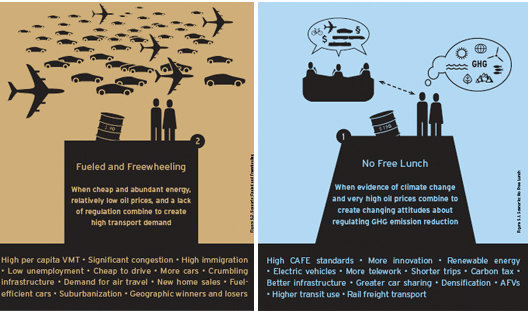
How will Americans get around in the year 2030? A recent report from the RAND Corporation lays out two "plausible futures" developed though a "scenario analysis" and vetted by outside experts. While RAND takes a decidedly agnostic stance toward the implications of each scenario, the choice that emerges is still pretty stark.
In the first scenario, oil prices continue to climb until 2030 and greenhouse gas emissions are tightly regulated, as a result of the recognition of the harm caused by global warming. Zoning laws have been reformed to promote walkable urban and suburban communities. Transit use has increased substantially. Road pricing is widely used to limit congestion and generate revenue for transportation projects. Vehicle efficiency standards have been tightened, and most drivers use electric vehicles. This is the scenario researchers at RAND call, rather dourly, "No Free Lunch."
In the second scenario, “Fueled and Freewheeling,” oil prices are relatively low in 2030 due to increasingly advanced extraction methods. Americans' relationship to energy is much like it was in the 1980s and 1990s. We'll own more vehicles overall and drive more miles. Suburbanization will continue. Roads are in bad shape because no revenues are raised to repair them. Congestion is worse. This scenario represents the future if little action is taken to counter the effects of global warming.
The difference between the two scenarios boils down to three factors: oil prices, level of regulation, and highway revenues and expenditures. While we might not have a great deal of control over oil prices, the other two, RAND points out, fall within the range of public policy. So in that sense either future is plausible.
In both cases the economy is healthy, though RAND thinks that in the "No Free Lunch" scenario, the U.S. economy grows about 2 percent annually, compared to 2.5 percent in the scenario with terrible congestion on crumbling roads and, presumably, catastrophic climate change on the horizon. RAND forecasts that in neither scenario will intercity rail travel represent an appreciable portion of total travel, nor will self-driving cars be a major share of vehicles.
A few aspects of the report are odd. In the scenario where America does something about climate change, "greater densities" are for some reason attributed to "new zoning restrictions," not the loosening of pervasive zoning rules that compel sprawling, single-use development with tons of parking. And RAND didn't analyze health and safety effects in its scenarios. Even though it must be a safe bet to predict that in a future where Americans are driving less and walking and taking transit more, thousands fewer lives would be lost in traffic each year, and people would be living longer thanks to the additional physical activity in their daily routines.





